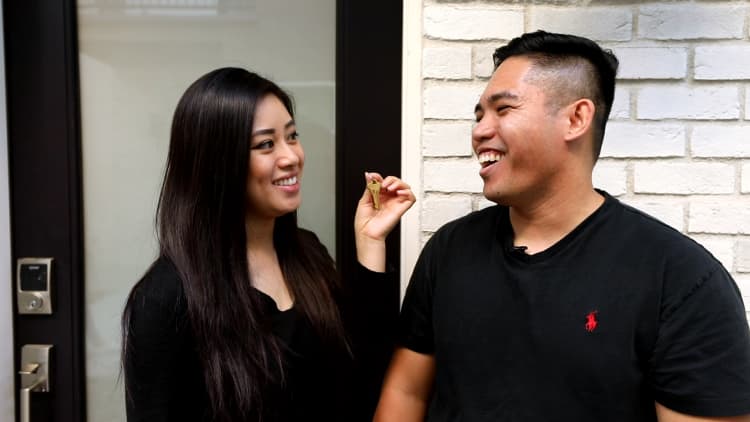Two years ago, Ver Starr and Jenelle Yee decided they were done writing rent checks and started socking away money to buy their first home. They saved enough to put $60,000 down on a $599,000, 3-bed, 2.5-bath townhome in Gardena, California, 12 miles south of Los Angeles.
The couple, both 28, closed in June 2019 and moved in a month later.
After successfully navigating the home buying process, they recommend all first-time buyers follow through on one important step: "Get pre-approved for a mortgage," Starr tells CNBC Make It.
A mortgage pre-approval analyzes your creditworthiness and tells you how much money you can afford to borrow at a specific interest rate. Ultimately, it can make the difference between winning a bid or not because it proves that you have the financial means to make the necessary down payment and future mortgage payments, and a seller is going to prefer that type of buyer.
Keep in mind that because your financial situation can change, a pre-approval has a shelf life of about three months, so you'll want to get your pre-approval letter only when you're serious about shopping for a home.

Getting pre-qualified for a mortgage is slightly different and a less in-depth process than getting pre-approved. For pre-qualification, you provide a lender with information about your income, assets and liabilities, but you don't have to show any paperwork to verify your information. It can give you an idea of what you can afford, but does not guarantee you'll get approved for the loan when you're ready to buy.
To get pre-approved, you'll need to show documents that back up your income, like pay stubs, tax returns and W-2 forms. You'll also need to bring documentation showing any other assets you have and personal information, including a valid form of identification and your Social Security number, for a credit check. Keep in mind that it's still not an absolute guarantee, however.
The process is typically free and takes anywhere from one to three days.
Starr and Yee were pre-approved for a loan up to $800,000, meaning that's how much they could technically afford to borrow with their $185,000 combined salary. But you don't have to spend what the bank says you can afford. They chose to look at properties under $600,000, a budget they settled on by working backwards from their monthly rent payment. "Since we were already paying close to $3,000, we were looking at monthly payments that would be around that," Starr tells CNBC Make It.
When setting your budget, experts typically recommend keeping your total housing costs to less than 28% of your gross income. Keep in mind that as a homeowner, those will encompass more than just the mortgage — they'll include things like interest, property taxes, homeowners insurance and other miscellaneous costs such as renovations and maintenance.
Starr and Yee's total housing costs, including their mortgage, property taxes, HOA fee, private mortgage insurance and homeowners insurance, run about $3,850 per month. That's more than what they were paying in rent, but it's worth it, Starr says: "We're building our equity in something that we own." Plus, it's an upgrade from their previous 2-bedroom apartment and a space where they plan to live when they start a family.
"We really like being out of that rent cycle and not having to feel stressed out every year when the rate of rent increases," he adds.
Don't miss: How this New Yorker saved to buy her first Brooklyn apartment at age 25
Like this story? Subscribe to CNBC Make It on YouTube!



